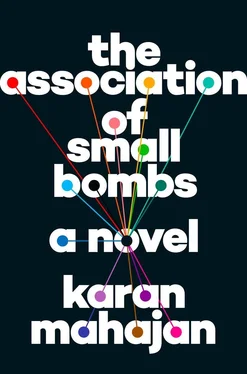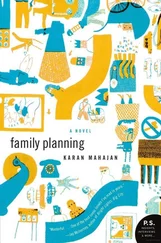Then they put their heads down and prayed.
Ayub had been trained in warfare; in shooting while lying on his stomach, while running, while out of breath, while the target moved; he had learned how to wire bombs, to carry fertilizer in a sack, to explain himself if he were caught (seven years later, the organization was using Shockie’s old technique of pretending its members were farmers, for the simple reason that most of the Indian bureaucracy is sentimental about farmers); but it had all happened fast and it was a jumble in his head. He did not feel that any of these things had entered into his muscle memory. Afraid to protest — he knew he was still on trial — he called up Mansoor from a freshly purchased mobile when he got back to Azamgarh.
“Who is this?” Mansoor said, his thick, croaky voice coming on.
When Ayub revealed himself, he said, “Ayub bhai! Where have you vanished?” The strange thing about Mansoor was that, though he often looked moody and stormy — possibly on account of his flaming eyebrows — when you got to know him, he could be quite goofy and funny.
Ayub told him he was coming to Delhi — could he stay with him?
Mansoor was a little stunned by the request — didn’t Ayub have other friends? Besides, in the past few months, things had changed for him at home. His relationship with his parents had turned toxic. As he’d grown angrier with himself about sex, he’d also become more self-righteous, judging his parents for their greed, telling them they should abandon the case with the Sahnis. “We’re religious in action,” his father had said.
“That’s nothing without actually taking time out for God,” Mansoor rebuked him.
Mansoor himself prayed five times a day, sometimes adding on the optional prayer, and increasing the rakat in each prayer.
If he prayed just enough, he thought, he could blot himself out.
“Why not do programming instead of praying so much?” his father asked. “Prayer is for old fogies like me. Young chaps like you should be out and about, working hard.”
“We shouldn’t be so ashamed to be Muslims,” Mansoor replied.
“Arre, where’s the question of shame? We have our last name. We are Muslims. If we were ashamed wouldn’t we have long ago left India? I’m only saying — do you need to pray five times a day to be a Muslim?”
“When Mohammed flew to Jerusalem on the Night Journey, God initially prescribed fifty prayers a day for all Muslims. It was Moses who told him to bargain it down to five. So five isn’t that much. So it’s a bargain, which you would appreciate as a businessman.”
“But do you need to wear the gol topi?” his mother asked, pointing to his skullcap. “You’ll get unwanted attention. Nowhere does it say you have to wear one.” Mansoor had overheard his parents talking about how it was a trend that had started only in the past ten years, as the mosques were flooded with Gulf money. They also talked about how people now said “Allah Hafiz” instead of “Khuda Hafiz” and how the money exchangers all carried signage in Arabic.
“Actually I should have a beard too — I’m only wearing the gol topi because I don’t want to grow a beard.” (He was afraid he couldn’t.)
“These days to call attention to yourself for being a Muslim—” his mother began.
“But it’s exactly because of this kind of shame that I’m wearing it! We have to get over all this shame and fear!”
________
So — to introduce his most strident Muslim activist friend to the mix would only increase the turbulence. Besides, what would Ayub make of his house, how rich he was? It’s good, thought Mansoor. I’ll tell him about our property loss now. He’ll like hearing about it. “Definitely come,” he told Ayub. “Stay as long as you want.”
________
When Mansoor told his parents that a friend would be staying, they did not react either way. “Of course,” his mother said, sadly, coldly.
________
Ayub had by now learned about his mission: he was to go to Delhi, stay with Mansoor, check e-mail regularly, and await orders. “It will be a blast!” Tauqeer said in English, joking.
“Is there a chance this will get my friend into trouble?” Ayub wanted to ask, but he was fearful and resisted. His palms turned on like taps. Sweat ran down his forehead. He developed an itch on his scalp under his soft, sandy hair. He blinked hard, often, girlishly. His breath hung in an awful cloud in front of him.
Delhi was sedate at this time, mid-October. There had been a fire in a hospital and a train collision, but nothing major — the kind of clear news weather you needed for a blast.
“I don’t want to kill innocents,” Ayub said. “I’m happy to kill people in the BJP, RSS, even the police.”
“We talked about this,” Tauqeer said. “Casualties can’t be avoided. If anything, it’s preferable. If you are worried about innocents, think about it this way — the fewer that die, the lonelier the victims are. It’s better for the event to be big, to affect many. People say 9/11 was the worst terror attack of all time — was it? I think the small bombs that we hear about all the time, that go off in unknown markets, killing five or six, are worse. They concentrate the pain on the lives of a few. Better to kill generously rather than stingily.”
The way he said it, without irony, was frightening. But there was also something idealistic about his flat exhortation — puffing his inhaler, he presented the image of a man who had thought things through and resigned himself to all of them. He had the unaffected, unshowy confidence of a young man who has dedicated himself to a difficult way of life. As a master terrorist, he no longer saw the strangeness of what he did or how he talked about killing.
Ayub became despairing. After spending a few days in Azamgarh, pretending to normalcy, visiting his parents for the last time after all, he headed to Delhi — the second time in six months he was making a journey to kill. He passed the tired stations with their tired paint and oozing pumps and acres of newsprint sold in stands, passed the charging boards, where men of all sizes and shapes plugged in their mobiles and sank onto their haunches, passed it all and felt: It’s up to God now. If God chooses to be absent from this hellish place, I understand. That’s the tragedy of Tauqeer, Rafiq, even me — we’re all fighting for a place long vacated by God, fighting to save hell.
What if I’ve died a long time ago and come here? he wondered. What if the defining characteristic of hell is that you’re locked in an endless, blind battle to reform it? He touched the dirty windows of the train compartment, pawing the yellow, urine-colored tinting to see if this was real. Yes, all tangible.
And what did that mean? Inside him, in a broth of blood and water, organs bumped softly, organically into one another, like fish in an aquarium. The train swayed. Who was to say there was anything more to you than this ? A computer, a system of organs bumping blindly within a sloshing pool, the attached head only doing the slavish bidding of the body, like a periscope emerging from the depths and mistaking itself for a living thing. Ayub closed his eyes and tried to hear his own heartbeat. But it was lost too deep in there and the train mercilessly drowned whatever was left.
Refusing Mansoor’s offer to pick him up from Old Delhi Railway Station, he took an auto to South Ex. In the past he’d taken buses, but he had decided to treat himself. Dozing between the open sides of the auto, he took in the industrial drama of the city. Factories, gathered and arranged into smokestacks, sent frantic plumes into the air. The power plants by the dried riverbeds were frightening to think about — the monsoon water tugging at the roots of the wires. Ayub remembered how, in Azamgarh, his friends put the two ends of a broken transmission line into a pond to shock the fish to the surface. The slick, oily shaking creatures that emerged were like the long, cut-off, vanished fingers of people…. Back in Delhi, trains charged by in their armor of municipal soot, bestowing their warmth and whistles on the city. A shuttered flour mill made of dull unaging brick, gorgeously stenciled in some ancient serif, went by, curved and flattened by the arc of a flyover.
Читать дальше












